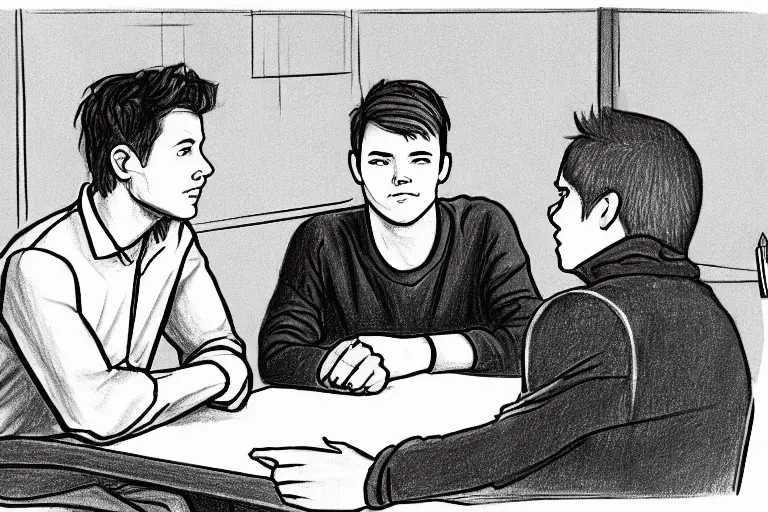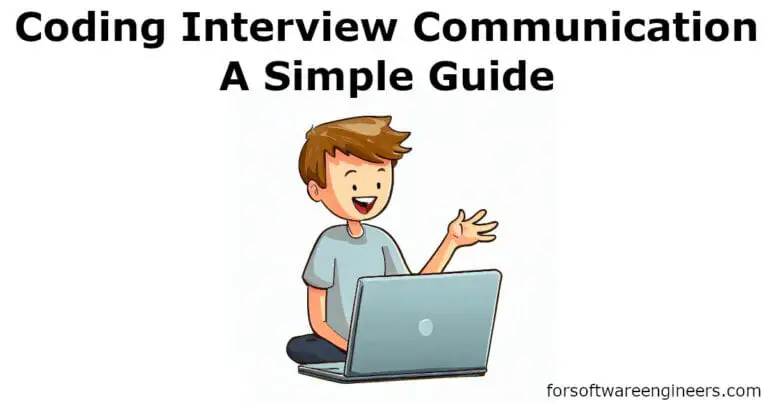6 Things To Do On The Day of a Coding Interview?
So you’ve finally made it to the day of your technical interviews. You’ve prepped for this day for a long time, putting in a massive amount of effort (maybe in addition to a full-time job).
So, what should you do on the day of your coding interview? Should you grind through some more LeetCode questions for practice? Should you skim Cracking the Coding Interview again for all the data structures and algorithms information?

In this article, I go over six things you could do on the day of your coding interview. This is based on my own personal experiences interviewing as a software engineer over a period of 5 years. I hope that this can be useful to you.
1. Relax And Focus On The Moment
The first thing that I found helpful to do is to relax and feel present in the moment. You should’ve already studied everything you needed to study before this day in terms of interview preparation.
This is easier said than done, but if you’re able to relax to get to a similar state you’d be in if you were practicing LeetCode problems on your own, then I argue you’ll be better off in the interview. Otherwise, your adrenaline will kick in and likely cause your mind to go blank on problems you’d otherwise have no issues solving.
To relax, you could do something simple like yoga or take a small walk around your neighborhood. Personally, I just sit down and relax for 15 minutes to clear my mind, after I make my usual cup of coffee I usually have in the morning.

I usually try to hit a meditative state where I’m able to not think about the interview for the duration of the 15 minutes. I just let my thoughts pass through my head until I’m fully present in the moment. This is what works for me, and I encourage you to try meditating, especially if you’re a naturally anxious person. It’s free and easy to do, after some practice.
2. Practice Some Easy Questions
Besides relaxing for about 15 minutes, I think it’s important to practice some easy problems to get your fingers and mind warmed up about solving LeetCode-style questions. It’s important to not go after new problems that’ll stress your mind because your interview rounds will likely require your full mental capacity. You don’t want to waste your brain power with cramming.
I recommend completing easy LeetCode problems that you’ve already completed in the past. You can push this thought a little bit further by solving some mediums that you’ve done already too. Focus on solving the problem correctly and on the first attempt.
Because you should’ve already completed these problems in the past, this shouldn’t tax your brain much. You shouldn’t feel fatigued after this practice.
3. Eat If You Usually Eat
If your interviews are in the morning and you usually eat breakfast, make sure to eat breakfast. This may sound like a minor thing, but it could matter a lot if you’re interviewing on an empty stomach when you’re usually fed during practice.
Your mind might not work optimally, in the sense that you’re used to during practice. So, it at all possible, you’ll want to make sure that you’re well-fed.
4. Make Sure That You Dress For Success
It doesn’t matter if you’re interviewing remotely or in-person. I personally recommend dressing up as if you were going into the office to interview in person.

This involves going through your entire routine like potentially taking a shower, putting on your watch, and maybe wearing cologne. You should be dressed from head to toe in whatever’s appropriate for the company you’re interviewing for.
Most tech companies allow their software engineers to wear smart-casual, but some companies (especially in the government and finance space) require their employees and candidates to dress in business casual.
It sounds cliche to dress for success, but from my own personal experience, this helps a lot with setting my personal tone for approaching technical interviews for the day. It also helps bring my confidence levels up and allows me to drive my interview when necessary.
5. Test Your Equipment
This portion of the day-of setup applies to people who are interviewing remotely.
If you’re interviewing remotely, it’s likely that you’ll be interviewing through an application like Zoom or Microsoft Teams. You’ll want to open up any communication software that the company you’re interviewing for requires and verify that your mic and camera work as intended.
You’ll want to do this well before your interview starts. You could even do this a day before your interview.
In addition to making sure that your video chatting software is working, take some time to make sure your accessories are working too. This includes things like your keyboard and mouse. It might sound silly to check them, but it’ll ease your mind knowing that everything that you need is working as intended.
Lastly, in terms of equipment, make sure that any links that your recruiter shared with you for the technical interviews are working too. Some companies use HackerRank or Coderpad to conduct their coding interviews. If you’re an experienced candidate, you might also have a system design interview done in linked applications like Google Draw or Excalidraw.
Make sure that these links work and take some time with getting familiar with the software, especially if it’s new to you. The tools should be relatively straightforward to use, but take a couple of minutes on each tool to familiarize yourself with the most important aspects of them.
6. Setup Your Interview Station

This portion of the day-of setup also applies to people working remotely.
Make sure that the place you’re going to be interviewing is quiet and clean. This will help declutter your mind during the interview if all you have is a keyboard, mouse, laptop (or desktop), pen, and paper.
If you need a hardwire for your internet connection, then make sure you’re able to find one and connect it to your computer. If you need some water, make sure to grab some and put it next to your desk.
If you have pets, now is the time to put them in another room or make sure that someone else can take care of them for your interview day. If you have a phone that’s always going off with alerts from social media sites and apps on your phone, put it on do-not-disturb mode or turn it off.
Basically, just make sure that the moment your interview starts, you have everything you could possibly need within arm’s reach in addition to eliminating all possible distractions. At this point, it should just be you and the interview in front of you. You should be relaxed and mentally prepared to begin the interviews with your best foot forward.







